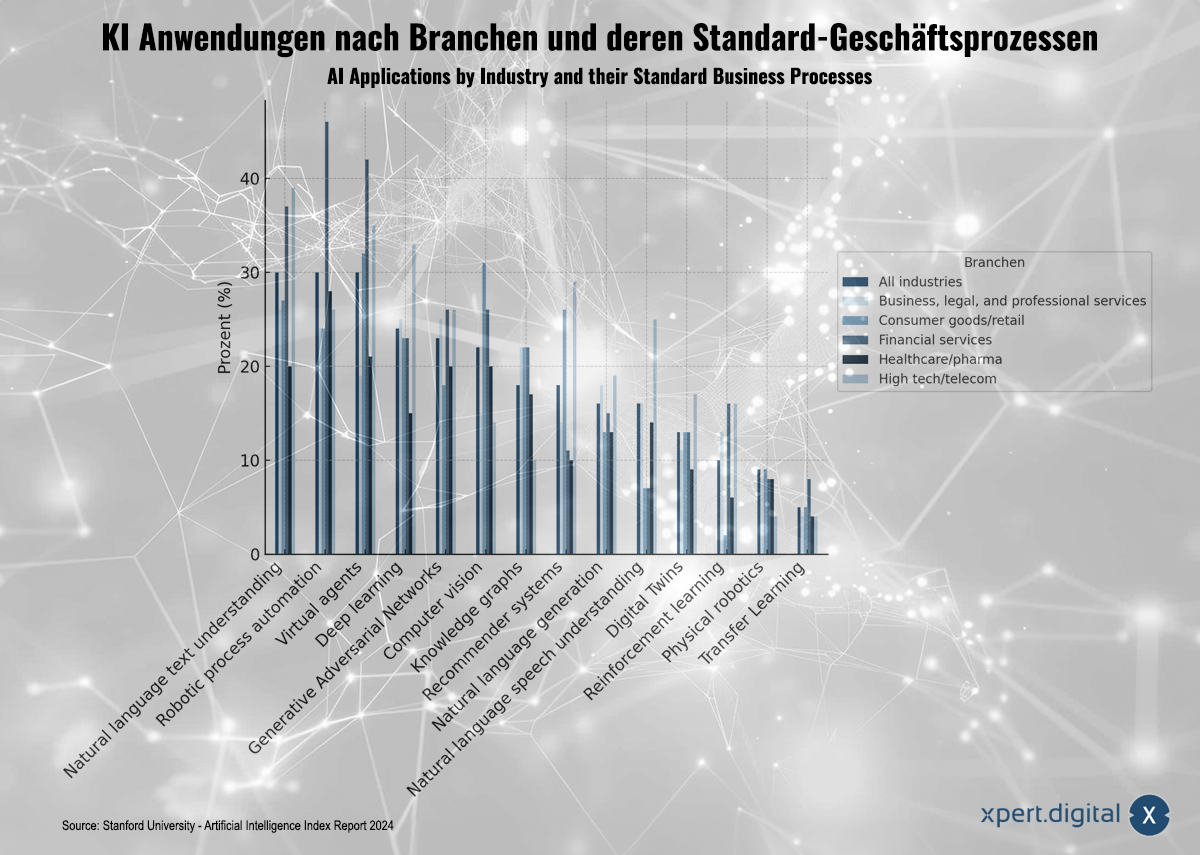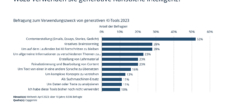
Which AI models hold the largest market shares? In which industries and business processes are they already being used? – Image: Xpert.Digital
🌐 AI Market Landscape: Analysis of Different Application Areas
🤖📊 Generative AI is currently one of the fastest-growing and most prominent areas within AI, but it doesn't necessarily have the largest market share among all AI technologies. Different AI applications serve different markets, and market influence depends heavily on the specific application area. Here's an overview of the market distribution:
🎨 1. Generative AI
growth
Generative AI has experienced a tremendous surge in popularity in recent years, particularly due to the success of models like GPT (OpenAI) and image generation systems such as DALL·E or MidJourney. Its applications in text creation, image and video generation, as well as music and content creation, have sparked the interest of many companies.
Market potential
Generative AI is widely used, particularly in media, marketing, entertainment, and the creative industries, but has also found its way into research (e.g., the generation of molecules in medicine) and design processes. Nevertheless, it remains a more specialized market than some other AI applications.
🔍 2. Predictive and Analytical AI
The largest market share of AI currently lies in applications that offer predictive analytics and pattern recognition. These include:
Machine learning
It is used in the financial industry, healthcare, manufacturing and logistics to make predictions (e.g. financial markets, customer behavior).
Big Data and Analytics
AI is widely used to analyze vast amounts of data in order to enable insights and decisions.
personalization
Systems such as recommendation systems in online shops (e.g., Amazon, Netflix) are based on predictive models and have an enormous influence on the market.
🏭 3. Automation and Robotics
Industrial AI
Automation systems based on AI are widespread in manufacturing and production. They optimize processes, reduce costs, and increase efficiency. These applications are dominant in traditional industries such as automotive, logistics, and agriculture.
Robots and autonomous systems
Autonomous vehicles, drones, and robots use AI to understand their environment and make decisions. This is another major growth area that targets real-world physical tasks.
🗣️ 4. Speech and image recognition (AI for task automation)
Voice assistants
Systems like Siri, Alexa, and Google Assistant are widely used AI applications in everyday life. Speech and image recognition models are among the largest AI markets, as they are used in smartphones, security applications, and task automation.
Image recognition
Systems for medical image analysis, monitoring and security use AI models to analyze data and recognize patterns.
🏥 5. Healthcare and Life Sciences
Medical diagnostics
AI is increasingly used in medical image analysis, disease diagnosis (e.g., cancer), and the development of new drugs. The healthcare AI market is growing rapidly and could become one of the largest markets in the long term.
📣 Similar topics
- 🤖 Generative AI: Strong growth in media and creative industries
- 📊 Predictive AI: Leading in market share thanks to predictive analytics
- 🚀 Automation and robotics: Increasing efficiency in industry
- 🗣️ Voice assistants: Everyday help through Siri, Alexa & Co.
- 🖼️ Image recognition: AI in medical image analysis and security
- 💉 Health technologies: AI revolution in medical diagnostics
- 🎨 AI and Creativity: New Horizons in Content Creation
- 📉 Financial markets and AI: Machine learning for better predictions
- 🚗 Autonomous Systems: Advances in Vehicles and Drones
- 🔍 Big Data and AI: Decision-making through massive amounts of data
#️⃣ Hashtags: #AI #GenerativeAI #Automation #PredictiveAnalytics #Healthcare
🤖📊 Which AI models have the largest market share in their respective industries and business processes?
Who leads in market share among AI models? Applications in sectors such as business, law, services, high-tech, and telecommunications, including business processes – Image: Xpert.Digital
Artificial intelligence (AI) has become an indispensable part of modern business processes in recent years. Companies across various industries are using AI technologies to increase efficiency, reduce costs, and develop innovative solutions. In this section, we will explore the different applications of AI in business and demonstrate how it is revolutionizing the way companies operate.
🗣️ Natural Language Processing
Natural language processing (NLP) is one of the most prominent applications of AI. It enables machines to understand and process human language. Companies use NLP to answer customer inquiries in real time, analyze documents, and even interpret complex legal texts. This technology not only improves customer service but also internal communication and knowledge management within organizations.
🤖 Robotic Process Automation
Robotic Process Automation (RPA) automates repetitive tasks that were previously performed manually. This includes filling out forms, processing transactions, and managing data. RPA not only reduces error rates but also allows employees to focus on more strategic tasks. In the financial industry, for example, RPA is frequently used to increase efficiency in processing loan applications.
🤖💬 Virtual Agents
Virtual agents, such as chatbots and voice assistants, are now widespread. They offer 24/7 support and can handle a variety of tasks, from answering simple questions to conducting complex transactions. In the retail industry, virtual agents improve the customer experience through personalized recommendations and rapid problem resolution.
🧠 Deep Learning
Deep learning, a subfield of machine learning, uses neural networks to recognize patterns in large datasets. This technology is used in various fields, including image and speech recognition, autonomous driving, and medical diagnoses. In healthcare, deep learning helps to detect diseases early and develop personalized treatment plans.
🎨 Generative Adversarial Networks
Generative Adversarial Networks (GANs) are an innovative form of AI that pits two neural networks against each other to generate realistic data. This technology is used in the creative industries to create artwork, compose music, and even develop new product designs. GANs have the potential to fundamentally change the way creative processes work.
👁️ Computer Vision
Computer vision enables machines to interpret visual information from the world around them. This technology is used in manufacturing for quality control, in agriculture for monitoring crop yields, and in the security industry for facial recognition. Businesses benefit from computer vision's ability to analyze large amounts of visual data quickly and accurately.
🔍 Knowledge graphs
Knowledge graphs structure information in a way that allows machines to understand relationships between different data points. They are used in search engines, recommendation systems, and knowledge management. Knowledge graphs help companies organize and use information more efficiently, leading to better decisions and innovative solutions.
🛒 Recommendation systems
Recommendation systems are an essential component of e-commerce platforms and streaming services. They analyze user behavior and offer personalized recommendations that improve the customer experience and increase sales. Companies use these systems to optimize their marketing strategies and increase customer loyalty.
✍️ Natural speech generation
Natural language processing (NLG) enables machines to create human-like texts. This technology is used in reporting, customer service, and content marketing. NLG can transform large amounts of data into understandable reports, thereby increasing communication efficiency.
🎓 Reinforcement Learning
Reinforcement learning is a branch of machine learning where machines learn to make decisions through reward and punishment. This technology is used in robotics, autonomous driving, and financial modeling. Reinforcement learning has the potential to solve complex problems and develop new business models.
🏭 Digital Twins
Digital twins are virtual models of physical objects or systems. They are used in manufacturing, construction, and healthcare to simulate and optimize processes. Companies use digital twins to reduce maintenance costs, accelerate product development, and increase operational efficiency.
🤖⚙️ Physical Robotics
Physical robotics encompasses the use of robots to automate physical tasks. In manufacturing, robots take over assembly work, while in logistics they handle the packaging and shipping of products. This technology reduces labor costs and increases production efficiency.
📚 Transfer Learning
Transfer learning enables models to transfer knowledge from one task to another. This technique is used in image and speech recognition to reduce training time and improve accuracy. Companies use transfer learning to react more quickly to market changes and develop innovative products.
🚀📊 AI Applications: A Cross-Sectoral Insight into the Future – Industry Overview
The tables above show the application areas of artificial intelligence (AI) in standard business processes, broken down by various industries worldwide. The values are given as percentages and illustrate the degree to which AI is integrated in the respective areas.
1. All industries
The most frequently used AI technologies are “Natural language text understanding”, “Robotic process automation” and “Virtual agents”, each accounting for 30%.
2. Business, Legal, and Professional Services
Here, “Natural language text understanding” (26%) and “Generative Adversarial Networks” (25%) dominate.
3. Consumer Goods/Retail
“Virtual agents” are the most widespread at 32%, followed by “Natural language text understanding” (27%).
4. Financial Services
“Virtual agents” (42%) and “Robotic process automation” (46%) are particularly important here with regard to automation and customer interaction.
5. Healthcare/Pharmaceuticals
The use of “robotic process automation” is highest at 46%, indicating the need to optimize processes and minimize errors.
6. High Tech/Telecom
“Natural language text understanding” (39%) and “Virtual agents” (35%) are leading the way in terms of customer interaction and processing large amounts of data.
🧠 Specific areas of application
Deep Learning
Particularly relevant in the financial sector (24%) and healthcare (23%), as it helps with data analysis and decision-making.
Generative Adversarial Networks
They are widely used in business and legal services (25%) to develop innovative solutions.
Computer Vision
In the financial sector (31%) and in healthcare (26%), it is important to analyze and interpret visual data.
Recommender Systems
Especially used in retail (26%) to offer personalized shopping experiences.
Reinforcement Learning
Used in the financial sector (16%) and in the high-tech sector (12%) to optimize complex decision-making processes.
📈 Depending on the specific requirements and goals
The tables show that AI technologies are used to varying degrees across different industries, depending on the specific requirements and goals of each sector. While some industries focus heavily on automation and process optimization, others use AI to improve customer interaction and data analysis.
We are there for you - advice - planning - implementation - project management
☑️ Industry expert, here with his own Xpert.Digital industry hub with over 2,500 specialist articles
I would be happy to serve as your personal advisor.
You can contact me by filling out the contact form below or simply call me on +49 89 89 674 804 (Munich) .
I'm looking forward to our joint project.
Xpert.Digital - Konrad Wolfenstein
Xpert.Digital is a hub for industry with a focus on digitalization, mechanical engineering, logistics/intralogistics and photovoltaics.
With our 360° business development solution, we support well-known companies from new business to after sales.
Market intelligence, smarketing, marketing automation, content development, PR, mail campaigns, personalized social media and lead nurturing are part of our digital tools.
You can find out more at: www.xpert.digital - www.xpert.solar - www.xpert.plus

